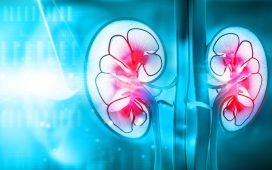Weight loss from age 20 to age 55 to 74 years was linked to reduced risk, especially for those who were overweight, obese
TUESDAY, Feb. 1, 2022 (HealthDay News) — Weight loss in adulthood is associated with reduced risk of incident distal colorectal adenoma, according to a study published online Feb. 1 in JNCI Cancer Spectrum.
Shishi He, from the University of Maryland School of Medicine in Baltimore, and colleagues assessed weight change during early-late (age 20 to baseline [55 to 74 years]), early-middle (20 to 50 years), and middle-late (50 to baseline) adulthood in relation to incident distal adenoma in the Prostate, Lung, Colorectal and Ovarian Cancer Screening Trial (1,053 cases and 16,576 controls).
The researchers found that weight loss during early-late adulthood was associated with reduced adenoma risk compared with stable weight (odds ratio, 0.54; 95 percent confidence interval [CI], 0.34 to 0.86), especially for those who were overweight or obese at age 20 (odds ratio, 0.39; 95 percent CI, 0.18 to 0.84). Similar results were seen for early-middle adulthood, but were less pronounced for middle-late adulthood. Increased risk was seen in association with weight gain of more than 3 kg in five years during early-late adulthood (odds ratio, 1.30; 95 percent CI, 1.07 to 1.58). The findings were stronger for men (odds ratio, 1.41; 95 percent CI, 1.11 to 1.80) than for women (odds ratio, 1.09; 95 percent CI, 0.79 to 1.50).
“Based on our findings, we would not recommend weight loss for all adults,” a coauthor said in a statement. “But the results suggest that overweight and obese adults may benefit from weight loss.”
Copyright © 2021 HealthDay. All rights reserved.








